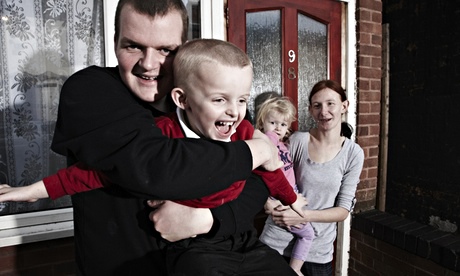
Benefits Street: The Last Word (C4) | 4OD
Benefits Britain: The Debate (C4) | 4OD
Bunkers, Brutalism and Bloodymindedness: Concrete Poetry (BBC4) | iPlayer
True Detective (Sky Atlantic) | Sky Go
This winter has seen two deluges. First, the never-ending rain and then the ceaseless torrent of words about Benefits Street. Although the series finished almost two weeks ago, the controversy has hardly subsided. Last week there was the optimistically titled Benefits Street: The Last Word, followed, as if to confirm the emptiness of that claim, by Benefits Britain: The Debate.
Channel 4's six-part documentary has been so divisive that, forget the show, people are still arguing over its name. The use of the word "benefits", say many commentators, has "demonised" those on benefits. I'm not sure of the logic of this argument. There should be no shame in claiming benefits if the claimants' circumstances entitle them to benefits.
And if the programme was focused on James Turner Street in Birmingham because the majority of its inhabitants were receiving benefits, then "Benefits Street" – rather than, say, "Marginalised and Socially Forgotten Street" – seems an appropriately snappy title to use.
But, ah, continued the critics, it suggests that all benefits claimants are like those on James Turner Street. I think most viewers are intelligent enough to realise that the programme was largely concerned with those who were in some sense trapped on benefits. In any case, the inhabitants who agreed to be filmed were mostly portrayed in a sympathetic light.
Far from demonising benefits claimants, Benefits Street humanised an alcoholic petty criminal (Fungi), highlighted the plight of Romanian immigrants, and turned a coarse, overweight single mother (White Dee) into something of a national heroine.
Of course it did a lot of other things that documentaries of this nature tend to do. It bent time, excluded the unexceptional and created dramatic narratives out of the mess of mundane life. All of which is misleading but, in this business, not exactly immoral.
It was also uneven. At times it captured something authentic and hidden; at others it felt forced and false. One moment bold and brave, the next evasive, leaving you uncertain what the real story involved. But beyond all that it gave a voice to a sector of society that is much heard about but seldom heard from.
That included people such as Danny, the charmless thief with more than 80 convictions. "How can you live not knowing who lives next door?" asked Dee of those unfortunate enough to be housed in less community-spirited streets than James Turner. But with neighbours such as Danny the question could be asked: how can you live knowing who lives next door? Yet plenty of people do and, by and large, it's commendable how they got on with it.
Benefits Street: The Last Word was an anticlimax, a piece of Channel 4 self-backslapping, designed with the programme's critics in mind to inform us that no humans were harmed during the course of filming. Some of them had even found jobs. And the film- makers were at pains to reassure us that everyone had, as it were, benefited.
Benefits Britain: The Debate, if anything, contributed even less. A chaotic studio affair in which the participants looked either nervous, fanatical, or like they were seriously regretting their decision to take part (the columnist Allison Pearson left after clashing with another columnist, Owen Jones), it was an object lesson in how not to conduct an intelligent dialogue. Inevitably the argument divided along political lines, with the right maintaining that it was damaging to leave people dependent on benefits and the left insisting that the real culprits were the irresponsible bankers.
But surely it's possible to hold the opinion that irresponsible bankers should be held to account and that it's damaging to leave people dependent on benefits. I would be tempted to call it common sense if Jonathan Meades, the intelligentsia's very own Jake Blues, hadn't dismissed that concept as "the most dismal of characteristics" in Bunkers, Brutalism and Bloodymindedness.
It was a characteristically Olympian judgment from one of the most intellectually stimulating cultural critics of our time. Even when he speaks nonsense – and he had his moments here – he does so in a manner that compels the viewer to think.
His contention was that we should not expect buildings to be pleasing to the eye. Nightmares, he argued, are more powerful than dreams. Perhaps, but no one wants to live in a nightmare, and the majority of the concrete blocks that marked second-generation modernism were indeed the stuff of bad dreams for the poor inhabitants who had to endure them.
Meades slapped down such bourgeois sentimentality, claiming that concrete council blocks of the 1960s and 70s, which he acknowledged had been inspired by Nazi military bunkers, had been falsely blamed for every dysfunction from shoplifting to drug addiction. One only has to survey the prim terraces of James Turner Street to realise that no architecture has a monopoly on social problems.
But Meades went much further. And in attempting to position architects as artists who have no responsibility other than to their muse, he may have resembled a rebellious, Ray-Banned, black-suited John Belushi. The worrying thing, however, was that he sounded like Ayn Rand.
Another week, another forensically well-made serial-killing cop show. True Detective starred major Hollywood budget-bait Woody Harrelson and Matthew McConaughey as ill-matched detectives investigating a weirdo murder in Louisiana in 1995 and then reflecting on the case 17 years later.
It was moody and edgy and shot through with unsettling dialogue, not all of it audible to someone who isn't fluent in mumbling and drawling. "I can smell the psychospace," said McConaughey's hyper-intense character. At least I think that's what he said. And I sort of knew what he meant. I just wish the odorous psychospace didn't always have to feature the naked, mutilated corpse of a woman.
That gripe aside, it looks utterly gripping.

